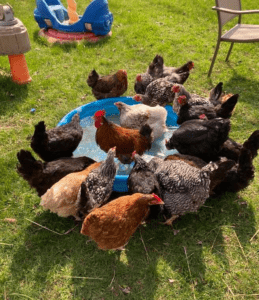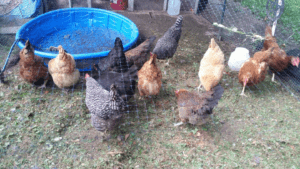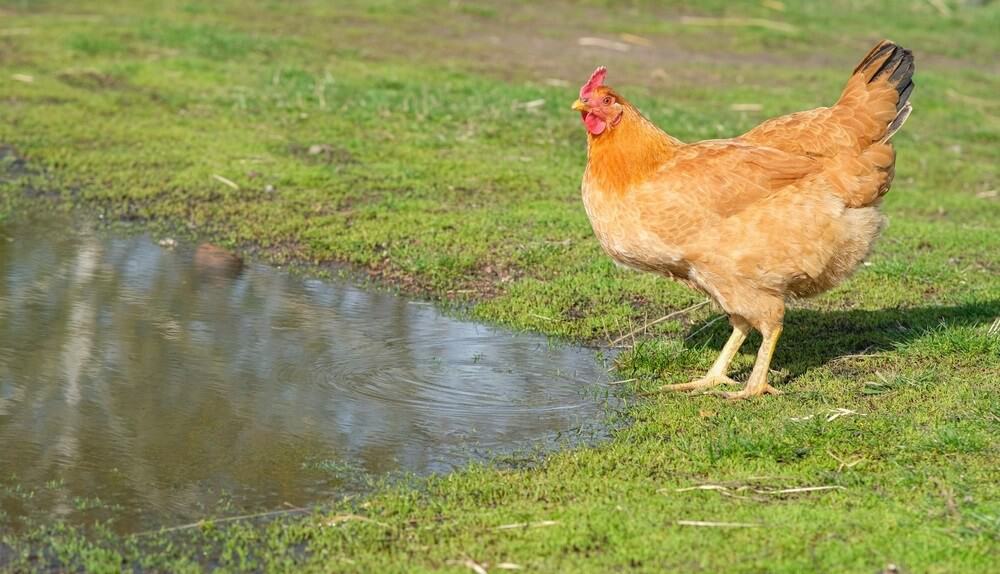Whether you want to raise chickens or are just curious, we answer: Can chickens swim. Yes, though their bodies aren’t designed to swim, chickens can swim. Even without waterproof feathers, chickens can swim in shallow water for a short period of time, but you should monitor them.
If you keep a flock or are simply interested, here’s what to know about chickens and swimming.
Can Chickens Swim
Chickens can swim for a short time. Here, I compare them with similarly-sized birds that can swim to help you understand it better.
Here’s a quick comparison between ducks and chickens so you can see how their body designs differ when it comes to swimming.
Ducks
Ducks can swim because:
- Ducks have powerful webbed feet that propel them.
- They have waterproof feathers.
- They can easily maneuver in the water.
These characteristics make ducks excellent paddlers and swimmers. Ducks also release oil through special glands that coat their feathers, which helps to keep them waterproof.

Chickens
A chicken’s anatomy is different than ducks’. Chickens cannot technically swim because:
- They do not have webbed feet.
- Chicken feathers do not have waterproof properties.
- They cannot easily maneuver in the water.
Technically, chickens cannot swim; however, they can if the situation presents itself. Chickens can paddle easily without webbed feet, but they aren’t as powerful in the water as a duck is, so their forward momentum is slower.
Swimming is part of a chicken’s survival system, but it’s not something they regularly do, so they should only spend a short time in the water. If you are raising chickens and have a shallow kiddie pool filled with water, they may enjoy sitting in it, especially on a hot day. Be sure it is not deep to help prevent drowning.
Do not allow chicks near open water as they may drown.
Chicken feathers are not waterproof as they don’t release the same oil as ducks. After they are wet, chickens sink like anchors, so it is not advisable to leave them in deep water very long as they can drown.
If your healthy chicken ends up in the water and manages to escape, make sure you pat it dry, especially if the temperature is cold, since it could easily suffer from hypothermia.
Another thing that can affect the chicken’s ability to swim is the fear factor. Many birds remain calm, but others get scared, and, consequently, chickens drown.
Can Chicks Swim?
No, chicks cannot swim. Unlike fully grown chickens, baby chicks must remain out of the water and protected to ensure they’re not in danger of sinking and drowning.

Water is a significant danger to a baby chick because its feathers aren’t fully developed, which means it can freeze and even drown faster than an adult chicken. So, even drinking water or a tiny puddle left by rain could put a chick’s life at risk.
Furthermore, make sure you protect the chicks from cold and rainy weather. Always provide them with a shallow drinking trough. If your chick accidentally slips into the water, the first thing you need to do is dry them off and warm them up. Please make sure they are warm, either using your hands or an electric heater.
Do Chickens Like Swimming in Water?
Even though they are not natural-born swimmers, chickens are adept at swimming and enjoy the water. Allowing them to bathe in water is an excellent way to keep chickens cool when there’s hot weather in the summer and maintain their cleanliness. It’s a great recreational activity as well! Keep Chickens Cool in the Summer Heat
If you let your chickens swim, use shallow water and supervise them to ensure they don’t panic and begin to sink. Chickens with calm temperaments are more likely to do better in swimming.
Don’t let chickens enter large bodies of water like the pool. Although they can swim, they may encounter difficulties in the deepest of water.
When supervising your chickens, keep track of the amount of time they spend in the water. As mentioned, chicken feathers cannot repel water. When they get wet, they can make the chickens feel exhausted, and they may drown.
Chickens are inherently helpless and will require your help in getting out. Again, you need to dry them off to prevent a cold. Like children, chickens don’t know that they’re getting too cold in the water and require your attention throughout the day.
Unless it’s a hot day, remember to dry off your chicken with a hairdryer on a low setting to keep the chance of suffering from hypothermia as low as possible.

Should You Put Chickens In Swimming Pools?
No, do not put a chicken in a swimming pool. The pool water IS too deep, and it contains chemicals, like chlorine, disinfectants, oxidizers, algaecides, clarifiers, and enzymes that can create a severe health risk to your animal.
If you allow your chickens to swim or float in the water, small plastic kiddie pool or infant swimming pool with natural water from the hose and an area to step out in case the hen has to leave are typically safe.
To prevent a chicken from getting stuck in the water, put blocks of concrete or bricks in the middle of the pool to ensure they have something to stand on and leave the pool quickly if they need to. Another option is to build a ramp up to the water. Again, the goal is to offer an exit point for any animal or bird within the water.

If you place chickens in the water with you, don’t leave them alone. Treat them as small children and watch how it swims. If you notice that a bird seems distressed, immediately pick it up. Pat them dry before taking them back to their coops.
Can Chickens Float
As explained earlier, chickens don’t have waterproof feathers, and they don’t make the same oil as ducks and other waterfowl that help them float in the water.
They do have some natural buoyancy that could keep them afloat for a short time. Ensure that your hens are always under supervision when you let them out of the coop.
Can Chickens Drown in the Rain
Chickens won’t drown in the rain but they can drown in water that pools. If you live in an area with monsoons or have areas on your property where rainwater gathers, such as a rainwater garden, take care to be sure your chickens are safe when it rains.
Protect Chickens from Water
If you have a koi pond or other pond on your property, ensure your chickens won’t have access to it. Also take care if you collect rainwater in rain barrels or if you have a fountain. Any standing water that chickens have access to can be a danger to them.
Provide fresh water for chickens to drink in chicken waterers, not from a pool.
To summarize, watch for these water hazards for chickens on your property:
- Water troughs for livestock
- Rainwater barrels, rainwater garden
- Dips in the property where water gathers during rainstorms
- Fountain
- Man-made or natural pond, koi pond
- Provide chicken waterers for chicks and chickens, not water buckets
Chickens Swimming
So, can chickens swim? Yes, they can, but they shouldn’t be put in water for recreation.
If they have access to a kiddie pool, fill it so it’s enough for them to walk in but not swim in. Providing shallow water will help ensure the chickens don’t drown. Chicks should not be near water.
Although it is amusing to see adorable videos of backyard chickens swimming with children, remember that water isn’t the natural habitat for these animals. So, if the chicken doesn’t want to swim, don’t force it. Chickens dominate the barnyard, not the water!
In conclusion, chickens can swim, but they are not the best swimmers. They are able to stay afloat for a short period of time, but they are not as graceful as other water birds and may eventually sink and drown. If you are looking to swim with your chickens, it is best to find a body of water that is shallow and not too deep. They will need to have the ability to get out on their own.
Learn about raising chickens for beginners.

